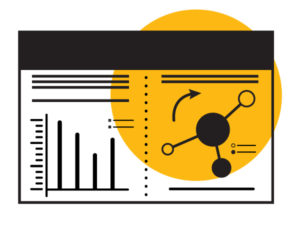
Improvements in Protein Bioprocessing
As more and more protein-based therapeutics enter research pipelines, more efficient protocols are needed. In particular, we need better protocols for the characterization of protein structure and function, as well as means of quantitation. One main step in this pipeline, proteolysis of these proteins into peptides, presents a bottleneck and can require optimization of multiple steps including reduction, alkylation and digestion time.
We have developed a new trypsin reagent, Rapid Digestion–Trypsin, that streamlines the protein sample preparation process. This new development significantly reduces the time to achieve proteolysis to about 1 hour, a remarkable improvement over existing overnight sample preparation times.
How Does it Work?
With this new trypsin product, proteolysis is performed at 70°C, incorporating both denaturation and rapid digestion. The protocol can be used with multiple protein types, including pure proteins and complex mixtures, and is compatible with digestion under native, reduced or nonreduced conditions.
A scientific poster concerning the development and performance of Rapid Digestion–Trypsin, is available for download. From the poster you will learn more about the workflow used with Rapid Digestion–Trypsin, see a time course for digestion and peptide appearance and learn about compatibility with quantitation methods. In addition, Rapid Digestion-Trypsin can be used in conjunction with affinity-purified samples.
Try Rapid Digestion–Trypsin and let us know how it works in your bioprocessing research workflows.
For more recent Trypsin advancements, visit our website and learn about Trypsin Platinum, Mass Spectrometry Grade, with enhanced proteolytic efficiency and superior autoproteolytic resistance.
Related Posts
Kari Kenefick
Latest posts by Kari Kenefick (see all)
- Fluorescent Ligands in Biological Research: Where We’ve Been, Where We’re Headed - June 27, 2024
- Cell-Based Target Engagement and Functional Assays for NLRP3 Inhibitor Profiling Help Identify Successes and Failures - January 25, 2024
- Illuminating the Brain with a New Bioluminescence Imaging Substrate - April 13, 2023
